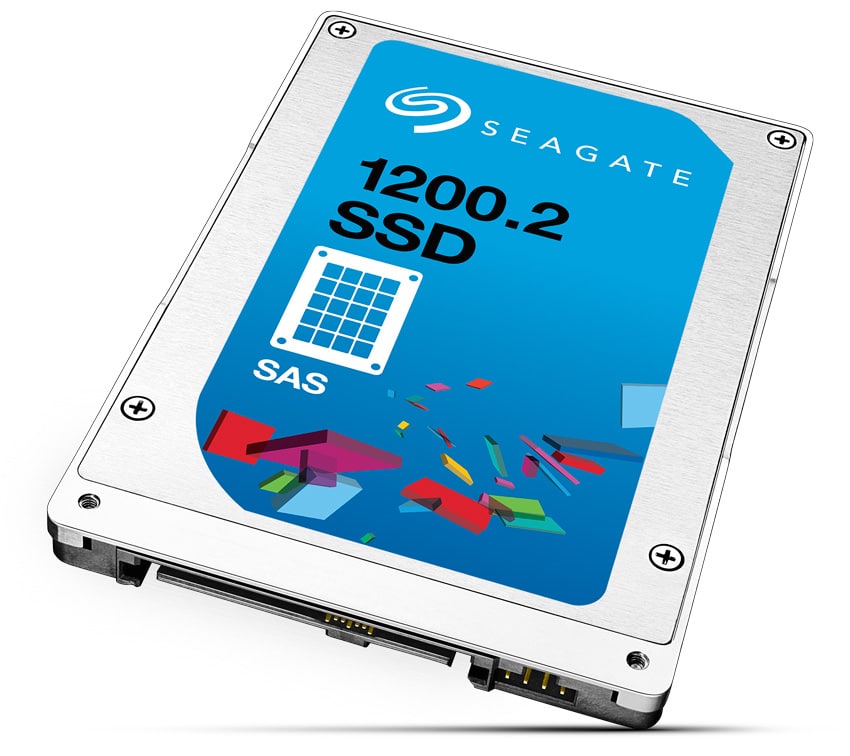Today Seagate Technology announced that through its collaboration with Micron Technology Inc. it is releasing a new enterprise SAS SSD, the 1200.2. The collaboration brings NAND technology to Seagate and access to SAS drive technology for Micron. The drives run in capacity up to 3.84TB and Seagate claims a single drive can hit speeds of 1800MB/s.
Today Seagate Technology announced that through its collaboration with Micron Technology Inc. it is releasing a new enterprise SAS SSD, the 1200.2. The collaboration brings NAND technology to Seagate and access to SAS drive technology for Micron. The drives run in capacity up to 3.84TB and Seagate claims a single drive can hit speeds of 1800MB/s.
The multi-year strategic alignment between Seagate and Micron was announced earlier this year. The agreement enables the two companies to combine their technologies, the first result being the dual port, 12Gb/s SAS SSD, the 1200.2. The 1200.2 offers four different endurance configurations making the product line flexible enough to be used in a variety of use cases. The 1200.2 is designed for OEMs who build scalable, modular storage solutions for enterprise applications. Though enterprise end users can also use the 1200.2 to upgrade their existing SAS storage.
Additional benefits include:
- Industry-leading storage density range including 4TB-class capacity in a 2.5-inch form factor
- Dual-port SAS interface configurable to provide up to 1800 MB/s sequential read performance or high data availability with failover redundancy and no single point of failure.
- Next generation Power Loss Protection (PLP) maintains high data integrity to prevent loss of user data in flight in the event of unexpected power interruptions.
- Superior data protection and reliability, achieved by combining full internal and external data path protection and multi-layered error recovery technology with advanced error detection/correction encoding optimized for NAND media.
- Three levels of security including secure diagnostics and download (SD&D), Seagate SecureTM Self-Encrypting Drive (SED) and FIPS drive.
Seagate 1200.2 specifications:
- High Endurance:
- Form factor: 2.5”
- Capacities: 400GB|200GB
- Interface: Dual 12Gb/s SAS
- NAND: eMLC
- Performance:
- Sequential Read (MB/s) Peak, 128KB: 1800
- Sequential Write (MB/s) Peak, 128KB: 800|600
- Random Read (IOPS) Peak, 4KB: 210K|205K
- QD32 Random Write (IOPS) Peak, 4KB QD32: 70K
- Average Latency (μs): 115
- Endurance:
- DWPD: 25
- Nonrecoverable Read Errors per Bits Read: 1 per 10E17
- AFR: 0.35%
- 5-year Warranty
- Mainstream Endurance:
- Form factor: 2.5”
- Capacities: 3.2TB|1.6TB|800GB|400GB
- Interface: Dual 12Gb/s SAS
- NAND: eMLC
- Performance:
- Sequential Read (MB/s) Peak, 128KB: 1800
- Sequential Write (MB/s) Peak, 128KB: 800|800|800|600
- Random Read (IOPS) Peak, 4KB: 210K|210K|210K|205K
- QD32 Random Write (IOPS) Peak, 4KB QD32: 70K|70K|70K66K
- Average Latency (μs): 115
- Endurance:
- DWPD: 10
- Nonrecoverable Read Errors per Bits Read: 1 per 10E17
- AFR: 0.35%
- 5-year Warranty
- Light Endurance:
- Form factor 2.5”
- Capacities: 3.84TB|3.2TB|1.92TB|1.6TB|960GB|800GB|480GB|400GB
- Interface: Dual 12Gb/s SAS
- NAND: eMLC
- Performance:
- Sequential Read (MB/s) Peak, 128KB: 1750
- Sequential Write (MB/s) Peak, 128KB: 750|610|750|610|750|610|750|390
- Random Read (IOPS) Peak, 4KB: 190K|175K|190K|175K|190K|175K|170K|170K
- QD32 Random Write (IOPS) Peak, 4KB QD32: 35K
- Average Latency (μs): 115
- Endurance:
- DWPD: 3
- Nonrecoverable Read Errors per Bits Read: 1 per 10E17
- AFR: 0.35%
- 5-year Warranty
- Scalable Endurance:
- Form factor: 2.5”
- Capacities: 3.84TB|1.92TB
- Interface: Dual 12Gb/s SAS
- NAND: eMLC
- Performance:
- Sequential Read (MB/s) Peak, 128KB: 1700
- Sequential Write (MB/s) Peak, 128KB: 500
- Random Read (IOPS) Peak, 4KB: 140K
- QD32 Random Write (IOPS) Peak, 4KB QD32: 15K
- Average Latency (μs): 115
- Endurance:
- DWPD: 1
- Nonrecoverable Read Errors per Bits Read: 1 per 10E17
- AFR: 0.35%
- 5-year Warranty
Availability
The 1200.2 SAS SSD are expected to ship to channel partners in this month.
Sign up for the StorageReview newsletter

